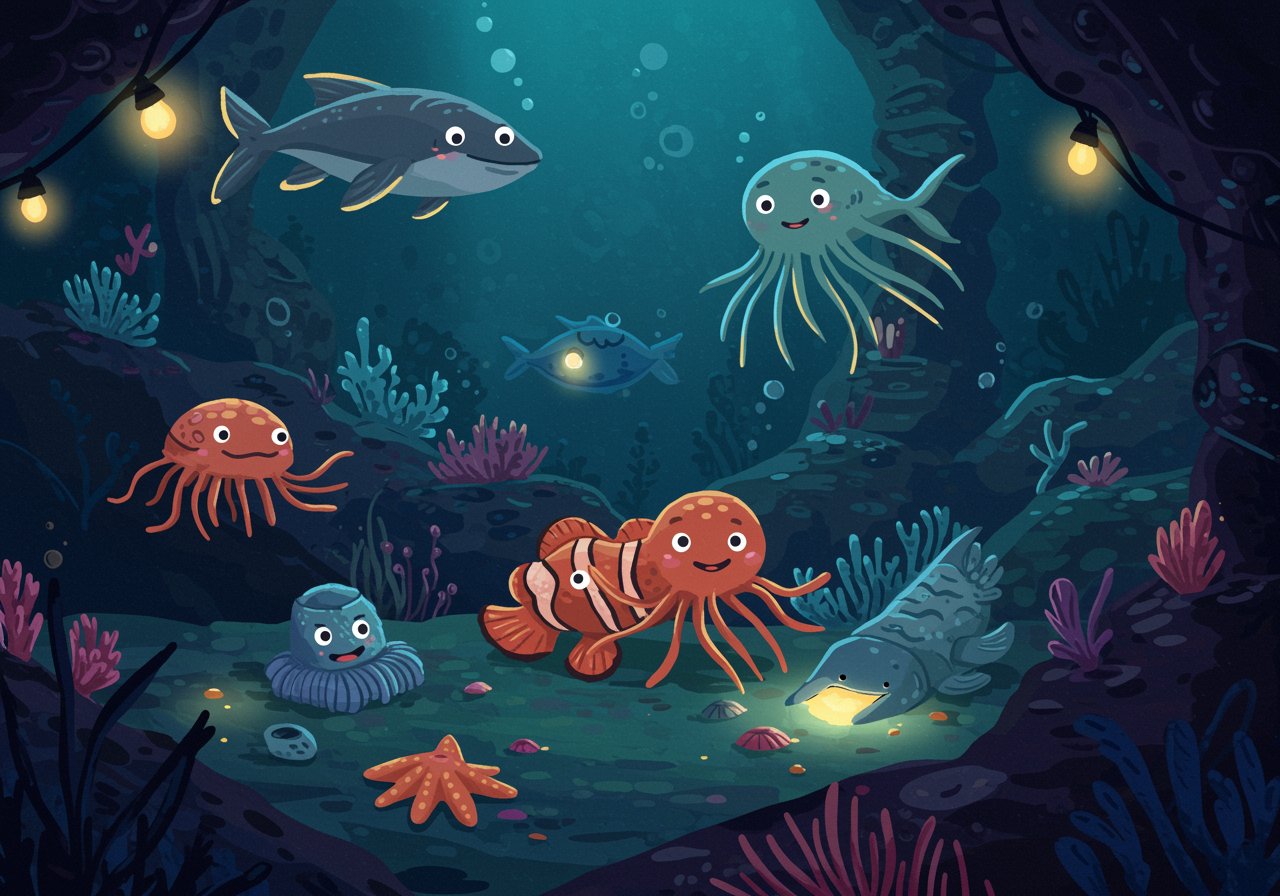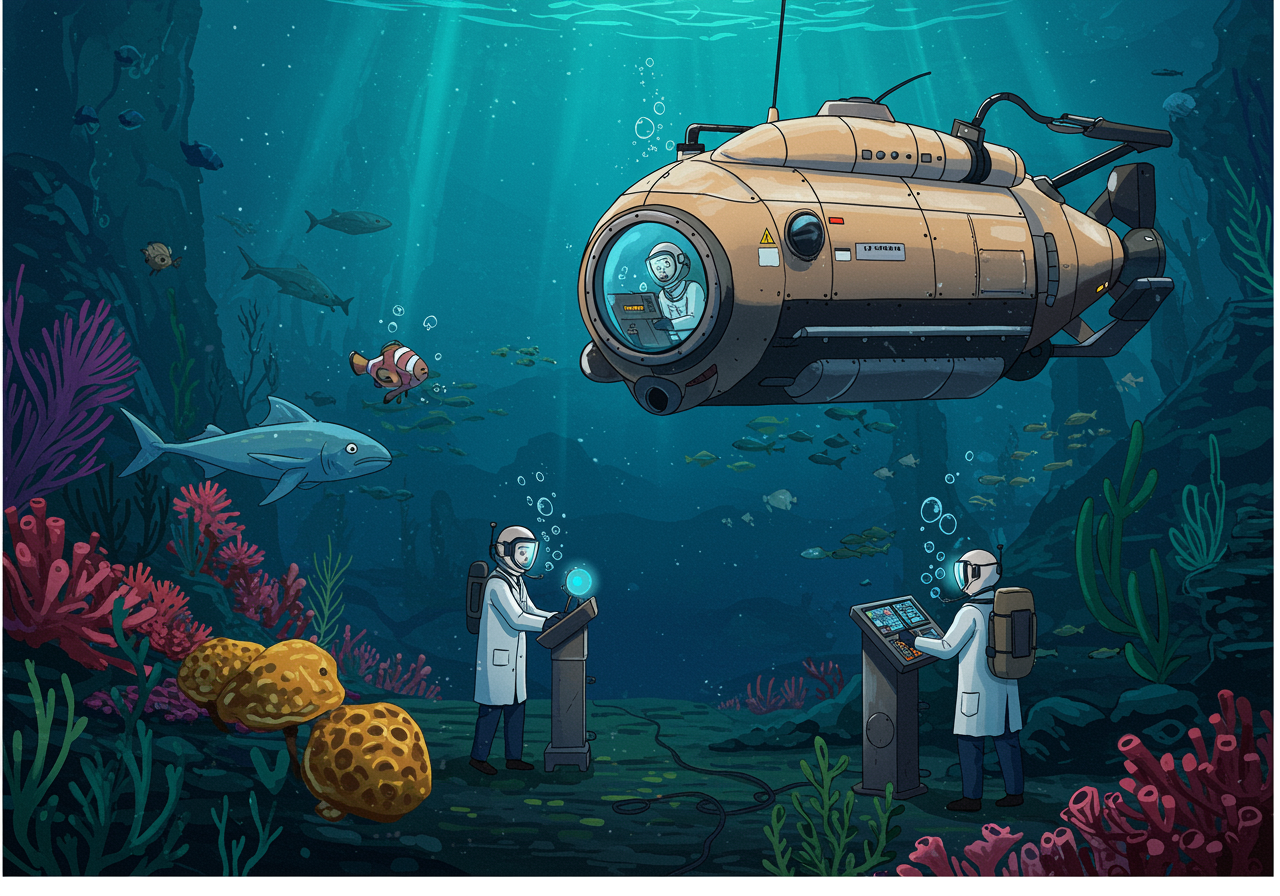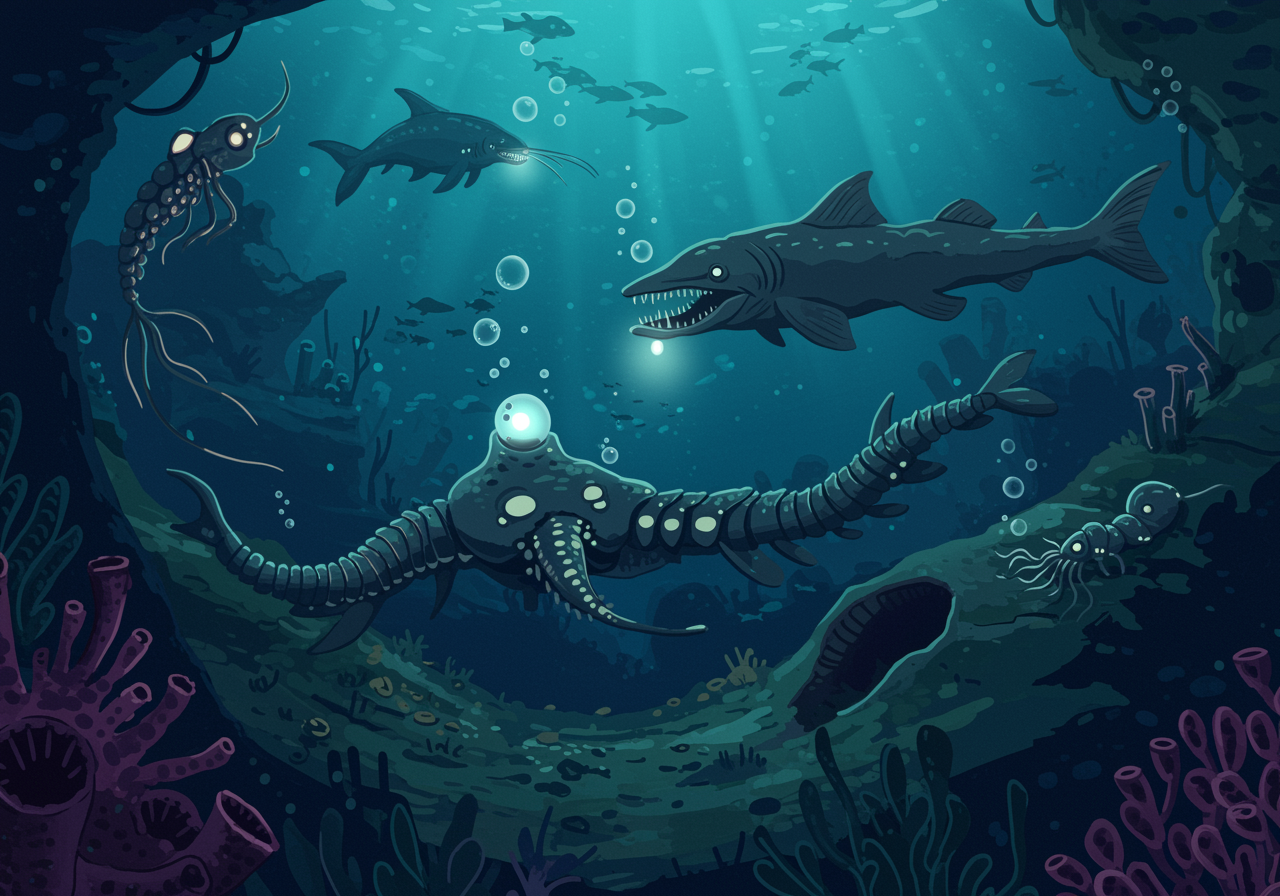Deep Ocean Detectives: Uncovering Earth’s Hidden Treasure Chest

Dive into the mysterious world beneath the waves where aliens live next door
Join your child on an amazing underwater adventure to discover why the deepest parts of our oceans might hold the keys to understanding life itself.
Overview
Think about this: we've explored more of Mars than we have of our own ocean floors! The deep sea is like a secret world right here on Earth, filled with creatures that glow in the dark, underwater volcanoes that create life, and processes that control our planet's climate. When you and your child explore these ocean mysteries together, you're not just learning cool facts – you're discovering how life finds a way to thrive in the most impossible places, which can spark amazing conversations about resilience, adaptation, and the incredible diversity of life on our planet.

Understand in 30 Seconds
Get up to speed quickly
- The Ocean's Hidden Universe: Over 95% of our oceans remain unexplored, making the deep sea more mysterious than outer space. Scientists estimate millions of species are waiting to be discovered down there!
- Life in Extreme Mode: Deep sea creatures live without sunlight, under crushing pressure, and in freezing temperatures. They've evolved amazing superpowers like making their own light and surviving on toxic chemicals.
- Earth's Climate Controller: Deep ocean currents act like a giant conveyor belt, moving heat around the planet and helping control weather patterns that affect everyone on Earth.
- Medicine Chest of the Future: Many deep sea creatures produce unique chemicals that scientists are studying to create new medicines for diseases like cancer and Alzheimer's.
Real Life Scenario
Situations you can relate to
Imagine you're moving to a new apartment, but this apartment has no windows, no heat, and the ceiling is constantly pressing down on you with the weight of a school bus. Oh, and there's no kitchen – you have to make your own food from scratch using only what you can find around the building. Sounds impossible, right? That's exactly what millions of creatures do every day in the deep ocean! They've learned to make light with their bodies (like having a built-in flashlight), create food from chemicals instead of sunlight, and build shells strong enough to withstand pressure that would crush a submarine. What would you need to survive in such an extreme place? How do you think these creatures figured out these amazing survival tricks over millions of years?

Role Play
Spark a conversation with “what if” scenarios
What if you were a bioluminescent deep-sea fish trying to find food in complete darkness?
- Role play: Turn off all the lights and give your child a small flashlight. Have them 'hunt' for hidden snacks around the room while you play other sea creatures. Discuss how making your own light helps but also might attract predators!
What if you discovered a new species at the bottom of the ocean and had to name it?
- Role play: Draw imaginary deep-sea creatures together, giving them special adaptations for extreme conditions. Create scientific names and explain what superpowers each creature would need to survive.
What if you were a marine biologist on a deep-sea expedition and your submarine suddenly spotted something no human has ever seen before?
- Role play: Set up a 'mission control' with your child as the submarine pilot describing their discoveries while you record their findings. Take turns being the explorer and the scientist back on the surface.
FAQs
Frequently asked questions people want to know
Why don't deep sea creatures get crushed by all that water pressure?
Their bodies are mostly made of water too, so the pressure inside matches the pressure outside. It's like squeezing a water balloon – the water doesn't compress much. Plus, they don't have air pockets like we do that would get squished.
How do scientists explore the deep ocean if it's so dangerous?
They use special submarines called submersibles that are built like super-strong metal spheres, plus underwater robots (ROVs) that can go even deeper. These robots have cameras, lights, and robot arms to collect samples.
Could there be huge sea monsters down there that we haven't found yet?
While we probably won't find dragons, there are definitely large creatures we haven't discovered yet! The deep ocean is so big and unexplored that new species – including some pretty large ones – are found regularly.
Examples in the Wild
See how this works day to day
- In 2023, scientists discovered over 100 new species during a single expedition to underwater mountains near Chile, including glass sponges taller than humans and fish that live deeper than any previously known. (Schmidt Ocean Institute)
- The Mariana Trench, Earth's deepest point, contains microbes that survive by eating chemicals from underwater volcanoes – giving us clues about how life might exist on other planets. (National Geographic)
- Deep-sea coral reefs, discovered in 2023 off the coast of Ecuador, are thriving in complete darkness and may hold secrets to helping shallow-water reefs survive climate change. (Nature Journal)
- The vampire squid, despite its scary name, actually survives by eating 'marine snow' – tiny bits of dead stuff that drift down from the surface like underwater snowflakes. (Monterey Bay Aquarium Research Institute)
In Summary
What you should know before you start
- The deep ocean is Earth's final frontier, holding more mysteries than outer space and affecting everything from our weather to potential future medicines
- Extreme conditions have created some of nature's most amazing adaptations, showing us that life finds incredible ways to survive anywhere
- Deep ocean exploration helps us understand how life began on Earth and how it might exist on other planets in our universe
- Every deep-sea discovery teaches us something new about resilience, adaptation, and the incredible diversity of life on our planet
Pro-tip for Parents
You got this!
If your child seems overwhelmed by the vastness of the unknown ocean, remind them that every great discovery started with curiosity and questions – just like theirs! Frame the unexplored ocean as an exciting adventure waiting to happen rather than something scary. When they ask questions you can't answer, celebrate that together by saying 'That's a great question that scientists are still trying to figure out!' This teaches them that not knowing something is the first step to learning.

Keep an Eye Out For
Find these examples in everyday life
- News about new deep-sea discoveries – they happen almost monthly and make great conversation starters about what else might be down there
- Nature documentaries about ocean exploration, especially ones featuring submersibles and ROVs that show the technology used to explore
- Local aquarium exhibits featuring deep-sea creatures or bioluminescence – many aquariums have special deep-sea sections or temporary exhibits
Explore Beyond
Look up these related research topics
- How do creatures in extreme environments (like hot springs or Antarctica) adapt to survive, and what can they teach us?
- What role do oceans play in climate change, and how do deep ocean currents affect weather around the world?
- How are scientists using technology like AI and robotics to explore places humans can't go, both in oceans and space?